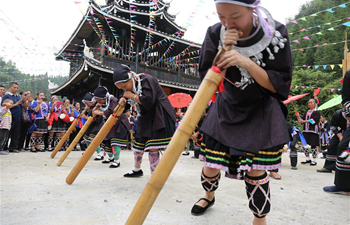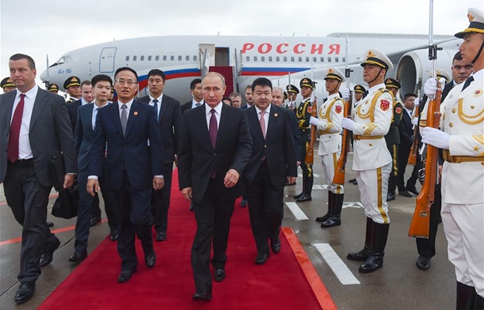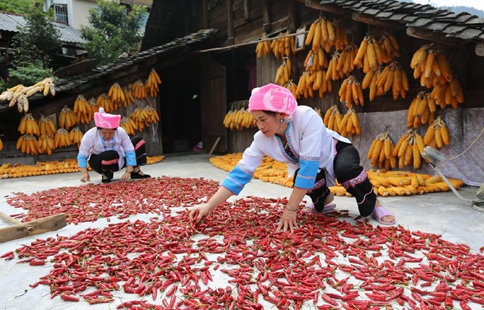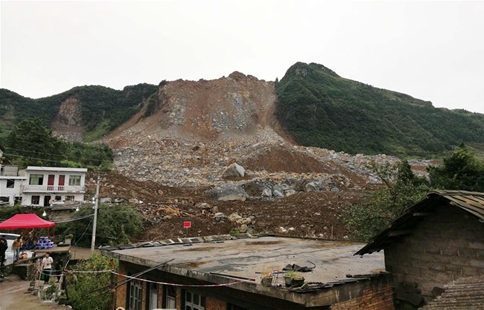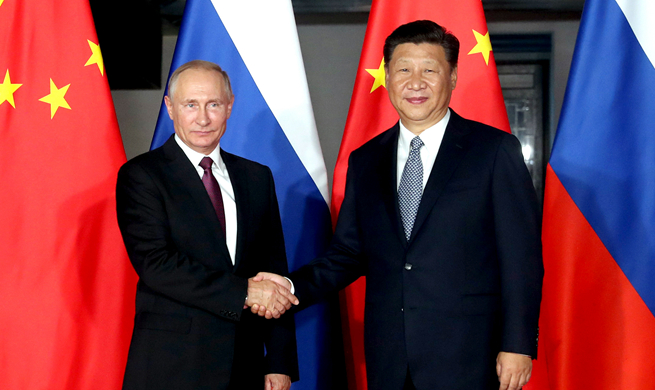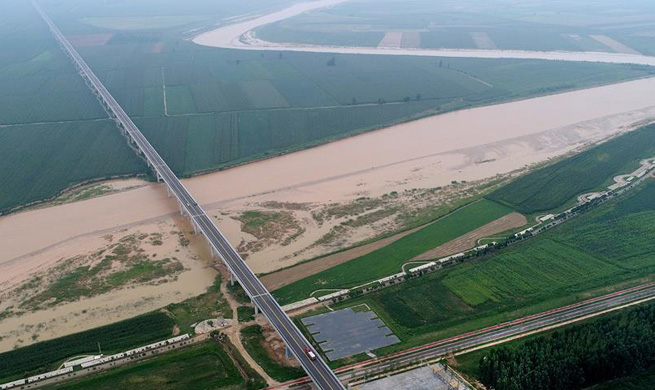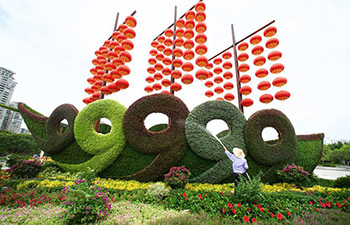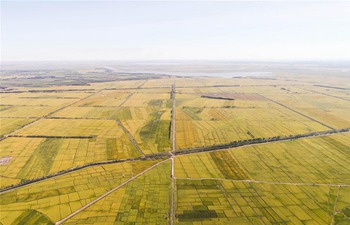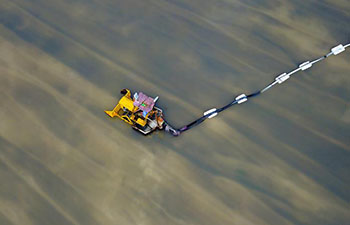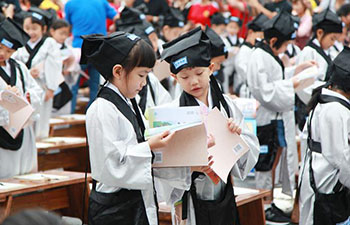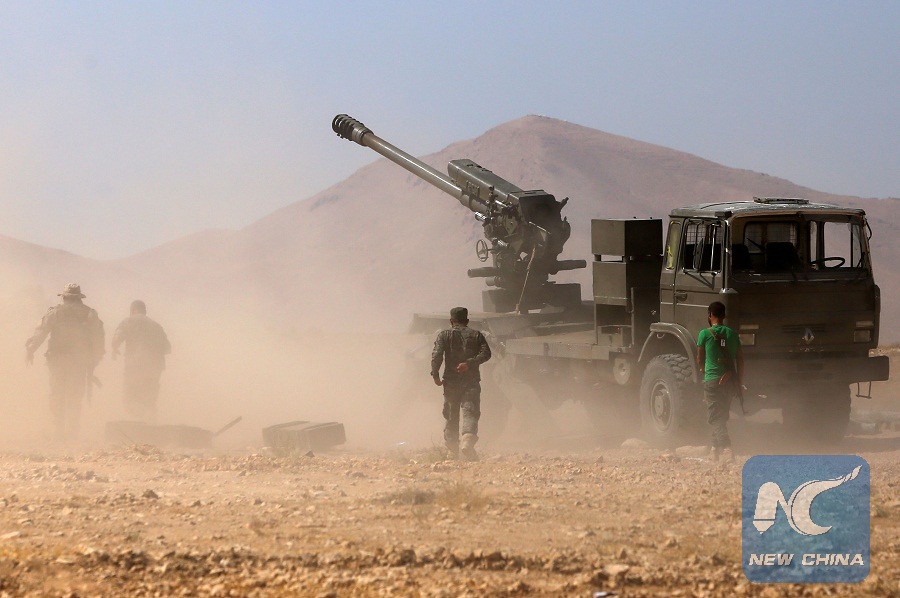
Fierce clashes kill over 150 fighters on Sept. 3 as IS group was fighting to protect their last bastion against Syrain troops. (AFP Photo)
by Hummam Sheikh Ali
DAMASCUS, Sept. 3 (Xinhua) -- The end of the Syrian war seems around the corner with the near collapse of the Islamic State (IS) group and the change of the international stance toward President Bashar al-Assad, experts say.
IS NEAR DEFEAT IN SYRIA
The Islamic State's fighters in Syria are reeling and buckling under the pressure of the massive assaults on their key positions in Syria.
The Syrian army and its allied Iranian-backed fighters have taken large swathes of territory in the Syrian desert in central Syria, following months-long battles with the IS militants.
Dubbed the "Great Dawn," the military operation that has been dragging on since May 2017, has enabled the army to reach border points with Jordan and Iraq through the Syrian desert region in the eastern countryside of Homs province in central Syria.
The desert operation has also stripped IS of key hub areas, mainly the city of al-Sukhnah, which was the key for the army to reach the administrative border of the IS-sieged Deir al-Zour province.
On Friday, the army announced reaching the border of Deir al-Zour, from the direction of al-Sukhnah.
The Syrian Observatory for Human Rights said Sunday the army has become so close to breaking the IS siege in the capital city of Deir al-Zour, which has been in place since 2015.
Some reports said hours are left until the siege is broken.
Deir al-Zour is the second, but the most important bastion for the IS militants, due to its proximity to IS-held areas in Iraq. Its first declared de-facto capital in Syria is the northern province of Raqqa, which is also under attack.
The Observatory, which says it relies on a network of activists on the ground, said the army and its allies have so far taken 3,000 sq km of territory in the vicinity of Deir al-Zour.
The UN and the Syrian army are carrying expensive airdrops of food and aid to around 100,000 besieged people in the besieged city of Deir al-Zour.
The Russian Defense Ministry said recently the army was close to breaking the IS siege in Deir al-Zour.
The army operations in the sprawling desert have also extended to the eastern countryside of the central Hama province, where IS holds key areas there.
The army on Friday drove out the IS militants from their key stronghold of Uqayribat town in the eastern countryside of Hama province in central Syria.
The town was a main IS stronghold and a launching pad for the IS attacks against the army in Hama countryside.
The IS control over the town had also posed a threat to the road between Hama and the northern province of Aleppo.
So now the army is close to declaring the victory against IS in the eastern countryside of Hama, the eastern Homs countryside in the desert, after laying a siege on IS-held areas, making it a matter of time before they completely surrender or get killed.
That will leave the efforts focused on Deir al-Zour.
In Raqqa, the self-declared capital of IS, the U.S.-backed Syrian Democratic Forces (SDF), an alliance of Kurdish, Arab and Assyrian fighters led by the Kurdish YPG, is also advancing against IS in the city of Raqqa.
The SDF said it had controlled the old city of Raqqa, following the sweeping progress made against IS.
The Syrian Observatory for Human Rights said the SDF were in control of 90 percent of the old quarter of Raqqa city, becoming close to the "secure zone" of IS, which "has reached the stage of collapse in Raqqa."
The London-based watchdog group said the IS militants have no place to treat their wounded militants, adding that the terror-designated group is killing its militants which suspect their cooperation with the SDF.
The Observatory said the advance of the Syrian army progress in Hama equals five times the size of Raqqa.
Reports already suggest that the SDF is controlling over 60 percent of Raqqa.
BEGINNING OF END OF WAR
UN special envoy to Syria, Staffan de Mistura, said on Friday that the IS' remaining strongholds in Syria are likely to fall by the end of October.
The Syrian government and the Russians are very likely to liberate Deir al-Zour by the end of September or the beginning of October, said the envoy.
As for the U.S.-backed SDF, de Mistura said the U.S. and its allies are expected to liberate Raqqa by the end of October.
"And that is where the challenge starts at this very moment," he said.
"What we are seeing is, in my opinion, the beginning of the end of this war... what we need to make sure is that this becomes also the beginning of peace. And that is where the challenge starts at this very moment," he said.
The envoy said the international community must push for the political process.
Abdul-Bari Atwan, a London-based Palestinian journalist, said in a recent article that the remarks of Mistura mean that the end of the Syrian war is near. He, however, noted that the period after the end of the war is risky with the absence of the political solution.
The political solution, which Mistrua has warned of its absence, remains essential to achieve stability and form an inclusive government in Syria with general elections, which could lead to a complete end of war, he said.
In his interview, Mistura said the end of war must be the trigger for the international community to push for free and fair elections.
But despite the worries of the post-IS era, experts in Syria also agreed that the beginning of the end of the war in Syria has begun.
Ayham Maray, a Syrian journalist and writer, told Xinhua on Sunday that the remarks of Mistura are close to the reality, thanks to the progress of the Syrian army in the war on terror.
"In tandem with the rapid progress of the Syrian army, there is a sort of international and regional understanding to swiftly end the IS extremists," he said.
Maray said that the developments on the ground and the military control over key areas in Syria are "arranging the papers on the table of de Mistura" for the upcoming round of the Geneva talks, which is expected to be crucial.
The upcoming round of Geneva talks, expected to take place in mid-October, will be preceded with intra-Syrian talks in Astana, which is expected to find a political end to the situation in the northwestern province of Idlib, where the al-Qaida-linked Nusra Front is in control.
Turkey and Russia will try to include Idlib in the de-escalation zones' deal, which has already included areas in southern and central Syria.
The Nusra Front fighters are expected to disband so that Idlib could be part of the de-escalation zones.
"All of these are signs of the near end of the Syrian war, or at least finding a solution to the crisis," Maray told Xinhua.
He said the recent developments are a sign of victory for the Syrian government, which has been withstanding the war for nearly seven years.
CHANGE IN INT'L STANCE TOWARD THE SYRIAN WAR
What strengthens the conviction that the solution is near is also the shift in the international stance toward Syria, particularly toward President Bashar al-Assad, whose ouster is no longer the Western powers' priority.
Boris Johnson, the British foreign secretary, recently said that "We used to say he (Assad) has to go as a precondition. Now we are saying that he should go but as part of a transition. It is always open to him to stand in a democratic election."
Former U.S. ambassador to Syria, Robert Ford, also acknowledged in a recent interview that Assad has won the war.
"The war is winding down little by little. Assad has won and he will stay (in power). He may never be held accountable, and Iran will be in Syria to stay. This is a new reality that we have to accept, and there isn't much we can do about it," he said in an interview with The National.
He added that "It's an acknowledgment that the military situation is strongly in favor of Assad, Russia and the Iranians, and that it is impossible to roll it back."
Ford, who is now a senior fellow at the Washington-based Middle East Institute, said that it would impossible for the rebels to win over Assad, even if their regional and international backers threw all kinds of support of weapons and cash behind them.
Also, Iranian President Hassan Rouhani said Sunday he sees a widespread acceptance among major powers that Assad should stay in place.
In an interview with the CNN, Rouhani, a key ally of Assad, said "I think today everyone has accepted that President Assad must remain so that we can combat the terrorists."





